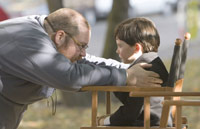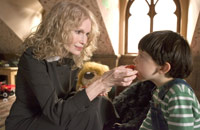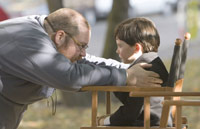It has been 30 years since The Omen introduced Damien Thorn, the five-year-old Antichrist, to moviegoers. The film marked director Richard Donner’s transition from TV to feature films (he went on to direct Superman, Scrooged and all four Lethal Weapons), and was famous for its grisly scenes of seemingly accidental but supernaturally motivated deaths.
Three decades, three sequels, and many parodies later, the film has been re-made for the big screen—and it comes out next Tuesday, which is (not coincidentally) 6/6/06!
The new film is written by David Seltzer, who also wrote the original movie (as well as last year’s TV mini-series Revelations), and it stars Liev Schreiber and Julia Stiles as Damien’s unsuspecting adoptive parents, Pete Postlethwaite as a paranoid priest, Mia Farrow as a darkly manipulative nanny, and newcomer Seamus Davey-Fitzpatrick as the title character—a young boy who is destined to become the Antichrist.
Director John Moore previously directed Behind Enemy Lines and the remake of Flight of the Phoenix. He spoke to Christianity Today Movies from his office in California.
In the 1970s, when the first Omen came out, the end times were a big deal, and seven or eight years ago, when the new millennium was coming, we had movies like Stigmata. But why make a movie like this now?

John Moore: I think we’re in a lot of trouble right now. I think times are very dark. I think we’re living in very fearful and hateful times, and so I think it’s an appropriate time [for the movie]. The Omen works on two levels—obviously it’s entertainment and the story’s a damn good yarn, but for my money there’s certainly a metaphorical aspect to the story, and I think that plays out more critically right now.
When you refer to dark times right now, the film actually shows footage of 9/11, but I don’t think it refers explicitly to Christian-Muslim tensions?
Moore: No, it doesn’t, and it certainly only hints at that in the images used, and I rather purposefully came at it a little bit sideways. [One character] says, “A great evil this way comes,” so I hope that’s interpretable in several ways, whether it be the Christian-Muslim tension, or the fact that we’re destroying the planet we live on, or the gap between rich and poor getting worse and worse. I feel very pessimistic about the world right now, and I think that’s reflected in the movie.
This film does use real-life news footage, especially in those opening scenes. Did you have any concerns that that might seem exploitative?
Moore: I personally didn’t, because we certainly used real-world images, but wholly in a fictitious context. What I’ve done in the film is shown people the real world and how bad things have gotten, and then play out this fable or parable with that as a backdrop.
I think all film is exploitation of emotion anyway. It seems to be a dirty word, but to me it’s just an accurate term of reference, as to the power of film. It is exploitative of your sensibility. But my intention wasn’t cynical. My intention was to get people’s attention, and to posit the notion that the time is ripe for a great evil to get the world in its grasp.
To what degree would you say the making of this film was motivated just by the fact that you had this once-in-a-lifetime opportunity to …?
Moore: The date? Oh yeah, that was a huge factor. People have referred to it as a cynical marketing exercise, to which I answer, “Could you please demonstrate what a genuine marketing exercise would look like?” There’s no doubt it’s a great hook, but you know, people make movies so that other people will see them, and you want to use anything you can to draw attention to your movie, so the tantalizing connection with the numbers was certainly a big factor in rushing the film into production.
Who approached whom? Was this a remake that you were interested in doing?
Moore: I’d heard that Fox was interested in making it as a Japanese-language remake for the Japanese market, because apparently anything to do with scary children is huge in Japan. And I said, “Why limit ourselves? Why not do a full-out world’s version of it?” So when I heard they were doing it, yeah, I chased it pretty keenly.

The Omen is very much rooted in Christian premises, and Christianity is certainly foundational to our civilization, but not in Japan, so what would the appeal be there?
Moore: Well, you see, there’s actually a refreshing lesson in the level of Japanese interest. I mean, they flew planeloads of journalists over here to see it, to talk to me. They’re absolutely fascinated by the movie. But I think what’s almost refreshing about it is they look at it as a story—and like you say, the religious context of the movie has no relevance to their culture, but they can see beyond that, to perhaps the bigger notion, the trans-religious notion of evil.
When the first film came out, interest in the Book of Revelation was incredibly high, thanks to authors like Hal Lindsey and Salem Kirban. Do you know those names?
Moore: Yes, I know them.
And more recently it’s been reflected in the Left Behind franchise. So how familiar are you with that sort of Christian subculture??
Moore: Yeah, the Tim LaHaye stuff. I know a little of LaHaye’s work. It’s funny, it seems most people think the Book of Revelation was written in 1976. It seems that it gets dusted off once every generation, and I think that phenomenon is, in itself, significant. The organized Christian religious groups—not that LaHaye’s is a group, but certainly those who believe in the Rapture, for example—seem to be quite an exclusive grouping, whereas a movie like The Omen is sort of all-encompassing, and invites everyone to examine the theories put forward in the work.
But I find, in general, my sensibility of Christian religious groups is, I have a sensation of exclusion. There’s something vaguely anti-Christian about it, to be quite honest. Do you know what I’m saying? It seems like there’s a pyramid structure to Christian religion in America, and those at the very top are holier-than-thou and are quite damning of people lower down in the pyramid, even though these people might be practicing-Christian. It strikes me as an irony, the level of are-you-in-the-club-or-not that tends to pervade—I use the term cautiously—an extremist Christian religion.
I can’t imagine what extremist Christian religion would be, except anything but a good thing. The basic tenets of Christianity are all about helping each other and being good, and I won’t ask you to agree or disagree with this, but to my mind, there seems to be more of a negative association with extremist Christian religion in America.
What sort of religious affiliation, if any, do you have yourself?
Moore: I’m an Irish Catholic. I was brought up Catholic, and I’m one of the—probably the over-used term is “lapsed Catholic”, because I don’t go to church regularly. But I still have a very deep sensibility of Catholicism, I believe in God, but I think, like—I’m 36, and I think a lot of people my age who have grown up with a college education and living a comfortable lifestyle have had very little reason in their life to question belief, and that’s just occurring to me really now, as I get older. I wonder why the lapsing occurs. And there’s some debate in my mind that suggests intelligence could be the enemy of belief. It’s almost like the more we educate ourselves, the smarter we get, and the less inclined we are, then, towards religion until the onset of a certain age—and then the insurance-policy mentality kicks in.

As one who believes in God, when you tackle a project like this, which does presume God and the Devil exist, do you feel an extra responsibility in telling this story? Not even to people groups, but just to God himself?
Moore: That’s a very good question, and the answer is complex. Maybe I’ll tell you a story and maybe therein lies the answer. Pete Postlethwaite, who plays Father Brennan, was brought up Catholic in England as well. I remember one day he was in costume, his tunic, his religious garb, and I remember goofing around and being what you could only interpret as disrespectful to the uniform, you know? And both of us just quietly remarked, somewhat rhetorically, how that could come to be when, as children, the sight of that tunic, the sight of a priest, that uniform, would strike, if not fear, then healthy respect into you. And yet, here we were, goofing around, like I say wholly disrespectful to the image of the uniform.
And so, to kind of answer your question, I subsequently then began to worry, quietly—you might say the exploitive manner of the film was of concern to me. I started to think, “Am I pissing God off?” If I believe in him, and if I have to follow that notion, then surely, I have to question whether or not I’m encouraging his wrath by making a movie like this. But then you extrapolate the theory further. The story of the film very much confirms the existence of a God, by the reflective demonstration of the existence of the Devil, and evil. It is by default that we are suggesting—we’re not even suggesting, we’re outright saying—that God exists. So ultimately, I think the film is an emboldened reaffirmation of the existence of God, and therefore I stopped worrying about it. How about that for an answer?
The original film was part of a trilogy. Are there any plans for sequels to this? Does Damien grow up?
Moore: It’s a very tantalizing prospect. But I think you have to remember the original film wasn’t planned as a trilogy. Seltzer’s work was very definitely making a statement that if we don’t watch it, the bad guy will win, and there will be no Hollywood ending. I think it was purely because of the success of the original that the commercial notion kicked in. But we certainly don’t have a plan.
You had a boy playing the Antichrist, and lots of bad stuff happens around him. How did you handle working with a child actor in that sort of context?
Moore: Well, you know, it’s funny. The great illusion of film really strikes me here. Because when you break it down, Seamus wasn’t really that involved in any of the harrowing scenes. He literally wasn’t on set for all the things. But of course, when you’re watching the whole film in a dark room, your perception is that he’s there all the time. So there wasn’t a lot to shield him from, because he literally wasn’t working on the days that the bad stuff happened. And we just kept reaffirming to him that this is a story, we’re telling a story, and we kept it very simple for him. Because like you said, nobody particularly wants to go around disturbing a six-year-old child. But his memory of the experience will be—is—a happy one, because he had fun doing it. He wasn’t around any of the bad stuff, so he has no visual memory of that stuff. And I hope he won’t see the film until he is of an appropriate age.
Copyright © 2006 Christianity Today. Click for reprint information.











